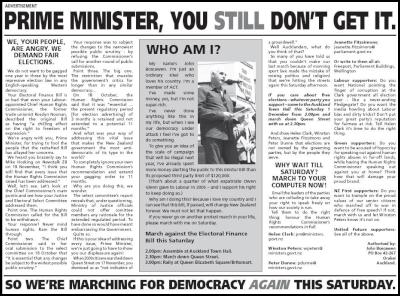Protest March against Electoral Finance Bill Dec 1
PRESS RELEASE
By John
Boscawen
30 November
2007

An advertisement that ran on Page A6 of Thursday’s New Zealand Herald. A similar ad appeared today and will do so again tomorrow.
http://img.scoop.co.nz/media/pdfs/0711/NZHeraldAd29Nov.pdf
I am organising a final Protest March against the Electoral Finance Bill, this Saturday 1 December marching down Queen Street.
The timetable will be as follows:
From
2.00pm: Assemble outside Auckland Town Hall Queen
Street
2.30pm: March off from
the Town Hall to QEII
Square/Britomart
3.00pm Rally
and speeches at QEII Square
I have
organized this march for a number of reasons:
1. The first march organised in Auckland a fortnight ago was attended by over 2000 people. This was the largest march in Auckland for some years. However, the Prime Minister dismissed it as the membership of the ACT and National parties and hardly indicative of a “groundswell”. This was despite the fact that a large number of the marchers had no political affiliation and had never marched before. This was confirmed by both TVOne and TV3 reporters. The calls to talkback and letters to the editor confirmed that the Prime Minister was wrong.
2. Since the last march the Bill has been reported back to Parliament and has passed its second reading. The restrictions placed on free speech under the Bill will apply for a full election year, up to eleven months in every three yearly electoral cycle. No other democracy in the world has such severe restrictions on free speech.
3. The Chief Human Rights Commissioner, Rosslyn Noonan, a former trade unionist appointed to the position by the Labour government said in her oral submission on 18 October to the Justice and Electoral Select Committee:
“The Commission’s preference is, and remains, that
the proposed legislation, the Bill is withdrawn and
redrafted to take into account the very substantial and
indepth submissions of the over 600 submitters to the Select
Committee.
If it is not to be
withdrawn, and rewritten, the Commission’s view is that it
is essential that any changes be subject to the widest
possible public scrutiny to ensure the credibility and
legitimacy of whatever electoral law reform
emerges”.
The Commission also said that the present regulatory period of three months should be retained and not extended to a potential eleven months. I attended the 18 October meeting in Wellington.
The Human Rights Commission has been ignored on all three counts. The Bill has not been withdrawn. Secondly, the amended Bill has not been subject to the widest possible scrutiny by a second round of full public consultation as requested by the Human Rights Commission. Thirdly, the up to eleven month restriction remains.
It seems incredulous that the Government is prepared to ignore it’s own Human Rights Commission on issues going to the heart of our democracy. It is even more incredible that the Green Party, NZ First Party and UnitedFuture each claiming to have proud records on human rights are prepared to support this legislation.
This final march will give New Zealanders another chance to protest that the Human Rights Commission has been ignored.
Ends


 Gordon Campbell: On The New Pope, And The Israeli Attack On Peter Davis
Gordon Campbell: On The New Pope, And The Israeli Attack On Peter Davis Water New Zealand: Stormwater 2025 - Tackling Flooding And Storms To Build A Climate-Resilient Future
Water New Zealand: Stormwater 2025 - Tackling Flooding And Storms To Build A Climate-Resilient Future New Zealand Labour Party: Labour Asks Why Govt Is Silent On Gaza
New Zealand Labour Party: Labour Asks Why Govt Is Silent On Gaza Transport Accident Investigation Commission: Near-Collision Highlights Safety Lessons For All Busy, Unattended Aerodromes
Transport Accident Investigation Commission: Near-Collision Highlights Safety Lessons For All Busy, Unattended Aerodromes Green Party: Wildlife Law Change A Deep Betrayal Of Public Trust
Green Party: Wildlife Law Change A Deep Betrayal Of Public Trust NZCTU: Unions Launch Petition To Protect Pay Equity
NZCTU: Unions Launch Petition To Protect Pay Equity Greenpeace: Greenpeace Slams PM’s Science Pick - 'Polluters Are Running The Show'
Greenpeace: Greenpeace Slams PM’s Science Pick - 'Polluters Are Running The Show'


